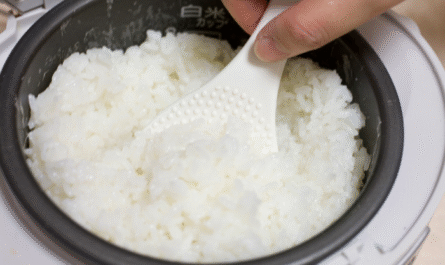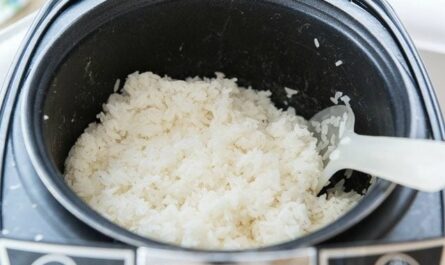When it comes to addressing anemia, many people might not immediately think of black rice as a potential solution. However, this nutrient-rich grain has been gaining attention for its possible role in combating anemia. As a sushi lover, you may already appreciate black rice for its unique flavor and aesthetic appeal, but its benefits extend far beyond taste. In this article, we will explore the relationship between black rice and anemia, and uncover how incorporating this superfood into your diet can positively impact your health.

What is Black Rice?
Black rice, often referred to as ‘forbidden rice,’ is a type of rice that is rich in antioxidants and nutrients. It gets its dark color from anthocyanins, which are powerful antioxidants also found in blueberries and blackberries. Unlike white rice, which undergoes processing that removes its outer layers, black rice retains its bran layer, making it a whole grain. This means it is packed with fiber, vitamins, and minerals that are beneficial for overall health.
The Nutritional Profile of Black Rice
Black rice is not only rich in antioxidants, but it is also a good source of iron, which is crucial for preventing and managing anemia. One cup of cooked black rice provides about 1.8 mg of iron, contributing significantly to the daily recommended intake. Additionally, black rice contains essential nutrients such as protein, fiber, and a range of B vitamins, all of which support various bodily functions, including red blood cell production.
Understanding Anemia
Anemia is a condition characterized by a deficiency of red blood cells or hemoglobin, leading to fatigue, weakness, and a range of other symptoms. Iron deficiency is one of the most common causes of anemia. Diet plays a crucial role in preventing and managing anemia, and incorporating iron-rich foods like black rice can be a natural and effective approach.
How Black Rice Can Help with Anemia
The high iron content in black rice makes it a valuable food for those looking to boost their iron intake. Iron is a vital component of hemoglobin, the protein in red blood cells that carries oxygen throughout the body. By consuming black rice regularly, individuals with anemia can support the production of healthy red blood cells and improve their overall energy levels.
Rich Source of Iron
As mentioned earlier, black rice is a good source of dietary iron. This mineral is essential for the production of hemoglobin and myoglobin, which are crucial for oxygen transport and muscle function. Including black rice in your diet can help prevent iron deficiency and maintain healthy blood iron levels, reducing the risk of anemia.
Boosts Antioxidant Levels
Black rice is loaded with antioxidants, particularly anthocyanins, which have been shown to reduce inflammation and oxidative stress. These antioxidants can support overall health and improve the body’s ability to absorb and utilize iron, further enhancing its anti-anemic properties.
Supports Overall Nutrition
In addition to iron, black rice is rich in other nutrients that are beneficial for individuals with anemia. These include B vitamins, which play a role in energy production and red blood cell formation, as well as protein and fiber, which support overall health and digestion. For more information on the nutritional benefits of black rice, you can visit WebMD’s article on the health benefits of black rice.
Incorporating Black Rice into Your Diet
As a sushi lover, you may already be familiar with black rice as a delicious alternative to traditional white rice. Its nutty flavor and chewy texture make it a versatile ingredient that can be used in a variety of dishes. Here are some ideas for incorporating black rice into your diet:
Black Rice Sushi
Swap out white rice for black rice in your favorite sushi rolls. This not only adds a unique flavor and color to your sushi, but also boosts its nutritional value. If you’re curious about the benefits of black rice during intermittent fasting, check out this article on black rice and intermittent fasting.
Black Rice Salad
Create a hearty salad by combining cooked black rice with fresh vegetables, herbs, and a light vinaigrette. This makes for a nutritious and satisfying meal that can be enjoyed as a main dish or a side.
Black Rice Pudding
For a sweet treat, try making black rice pudding by cooking black rice with coconut milk and sweetening it with honey or maple syrup. This dessert is not only delicious but also packed with nutrients.
Potential Concerns and Considerations
While black rice is generally considered safe and healthy, it’s important to be aware of potential allergies or sensitivities. Some individuals may experience allergic reactions to black rice. If you’re concerned about allergies, consider reading this article on black rice and allergies for more information.
Moderation is Key
As with any food, moderation is key. While black rice is nutritious, it should be consumed as part of a balanced diet. Overconsumption of any single food can lead to imbalances in nutrient intake.
Conclusion
Incorporating black rice into your diet can be a delicious and effective way to support your body’s iron levels and combat anemia. Its rich nutritional profile, combined with its unique flavor, makes it a valuable addition to any diet, especially for sushi lovers. By understanding the benefits of black rice and how it can positively impact your health, you can make informed choices that contribute to your overall well-being. For additional insights into black rice and its effects on digestion, visit this article on black rice and digestion.

FAQ
Is black rice better than white rice for anemia?
Yes, black rice is generally better than white rice for anemia due to its higher iron content and antioxidant levels, which can help improve iron absorption and overall red blood cell production.
Can I eat black rice every day?
While black rice is nutritious, it’s best to consume it in moderation as part of a balanced diet. Eating a variety of foods ensures you get a wide range of nutrients.
Are there any side effects of eating black rice?
Black rice is generally safe for most people, but some individuals may experience allergic reactions. It’s important to be aware of any allergies you may have and consult with a healthcare professional if needed.
This article contains affiliate links. We may earn a commission at no extra cost to you.




